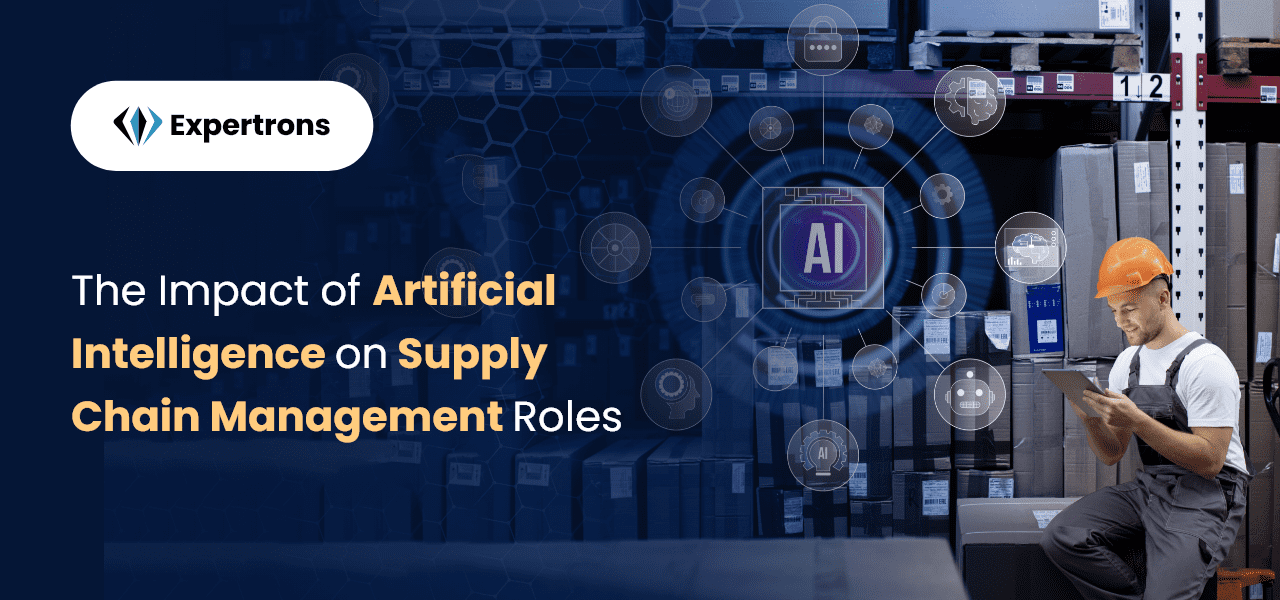Introduction
The global supply chain ecosystem has witnessed a paradigm shift with artificial intelligence ushering its way to change supply chain management roles altogether. This huge leap adds another tool to the advancing technology and fundamentally alters how businesses amplify their supply chain operations.
These rapid advancements have profoundly impacted supply chain management roles. Pushing professionals to adopt a more strategic approach to address new evolving opportunities in the supply chain field.
Hence, today’s article will look into how AI is transforming supply chain operations. Reshaping the industry and setting the stage for the future of logistics careers!
Effect of AI on Supply Chain Management Roles
The supply chain landscape has made significant advancements owing to the evolution of artificial intelligence and its incorporation into the supply chain. Below, we will look into how AI has boosted operational efficiency and taken over manual, repetitive tasks with more advanced automated technology:
Optimisation of Supply Chain Operations:
AI profoundly impacts supply chain management roles by optimizing operations. It streamlines processes, automates routine tasks, and offers data-driven insights. Leading to increased efficiency, reduced costs, and improved decision-making in supply chain management.
Inventory Management:
Integrating AI into inventory management within supply chain roles has enhanced precision and operational efficiency. It automates the optimization of stock levels, leading to cost savings, and guarantees timely product availability to meet customer demands. Resulting in improved supply chain performance.
Predictive Analysis:
The inclusion of AI into supply chain operations has only boosted the efficiency of the processes but also enabled to draw more precise forecasts. It uses data-driven insights to anticipate future trends, demand fluctuations, and potential disruptions. It empowers professionals to make informed decisions, optimize operations, and enhance supply chain efficiency.
Demand Forecasting:
Predicting product demand beforehand is one of the major challenges supply chains face. However, with AI integration, supply chain professionals can now monitor social media trends, complex data and weather forecasts. And adjust or plan accordingly, mitigating stock-out or overstocking risks.
Supply Chain Visibility:
Enhanced visibility in the supply chain is the ability to gain real-time insights and accurate data at every stage of the supply chain process. This is due to integrating AI-driven technologies across supply chain stages. This visibility enables businesses to make informed decisions, optimize operations, and reduce risks. And enhance overall efficiency, ultimately improving customer satisfaction and competitiveness.
Want to know more about supply chain management opportunities and challenges?
Read Challenges and Opportunities in Supply Chain Management Careers
How is AI going to shape and reinvent Supply Chain Management Roles?
The Supply Chain Management system has been revamped with the integration of AI. It has revolutionised supply chain management roles by making operations more streamlined, data-driven insights, faster decision making and whatnot.
This massive upgrade will have supply chain professionals break free from complex routine tasks and focus more on strategic planning and problem-solving. As new supply chain management roles evolve, operational efficiency and customer expectations will also accelerate.
Customers can now expect swiffer services at low cost. Redefining the borders of supply chain management with new roles requiring skills and expertise. As you see, AI can bring a massive revolution in the overall work experience and amplify operations, providing more powerful tools to enhance efficiency and lower costs.
In this transformative landscape, supply chain roles are redefined significantly, necessitating a more specialised and diversified skill set. Today’s supply chain professionals must not only embrace AI tools but also possess the ability to decipher intricate data and implement AI-driven strategies to sustain the shift supply chain ecosystem.
Looking for opportunities in Supply Chain Management Roles or logistics courses? Explore more about the Certification Program that offers paid internships in companies like FedEx, Delivery, Global Logistics and many more!
Addressing Supply Chain Challenges with Professional PG Certifications
To thrive amid challenges and new opportunities in supply chain management careers. Professionals must prioritize education and skill development by earning recognized supply chain certificates.
Positions that were once primarily focused on routine tasks are evolving into roles demanding profound expertise in AI technologies, data science, and analytics. This requires professionals to turn to supply chain certifications to thrive in this new landscape.
These certifications offer a roadmap for acquiring the skills needed to harness AI’s potential and ensure they remain at the forefront of this exciting transformation, propelling their careers into the future of supply chain management.
The transition to more diverse and strategic supply chain management roles is now made easy with Expertrons’ renowned Post Graduate Certification Program in Global Supply Chain Management and Logistics. It presents a comprehensive curriculum that seamlessly blends industry concepts with practical applications, delivering a well-rounded learning experience tailored to industry requirements.
Furthermore, it offers an immersive learning experience with live training led by eminent industry leaders, hands-on internship experience with the potential to earn stipends up to Rs 15,000 and 100% placement support with a minimum CTC of 4LPA!
Conclusion
AI is undeniably revolutionizing the supply chain landscape, ushering in a new era of efficiency and effectiveness. By leveraging automation, data analytics, and predictive capabilities, AI is streamlining operations, enhancing decision-making, and reducing costs across the supply chain.
However, this transformation is not just about technology; it’s also reshaping the roles within the supply chain. As AI advances, the demand for expertise in these areas will grow, diversifying skill sets and empowering supply chain professionals to navigate the complexities of the AI-driven supply chain landscape.
Through continuous learning and keeping yourself current with ongoing patterns in the industry, professionals can successfully transition to more diverse supply chain management roles.
Frequently Asked Questions
Artificial intelligence is crucial in supply chain management by optimising inventory management, supply chain visibility, predictive analysis and demand forecasting. AI helps in more accurate decision-making, resulting in greater efficiency and cost reduction.
AI enhances supply chain visibility by monitoring various data and demand fluctuations, tracking shipments in real-time, optimising inventory, facilitating better decisions and creating more feasible resolutions.
The key benefits of using AI in supply chain management are enhanced operational efficiency, better and more accurate decision making and reduced costs, ultimately leading to increased customer satisfaction and effectiveness.
Some challenges that supply chains might face while implementing AI are integrating AI solutions into existing supply chain systems, initial setup costs training and the need for skilled talent to effectively use AI mechanisms.
Some examples of AI technologies in supply chain management include predictive analytics for demand forecasting, warehouses and logistics automation, autonomous drones required for inventory optimisation, supplier communication and data analysis.











